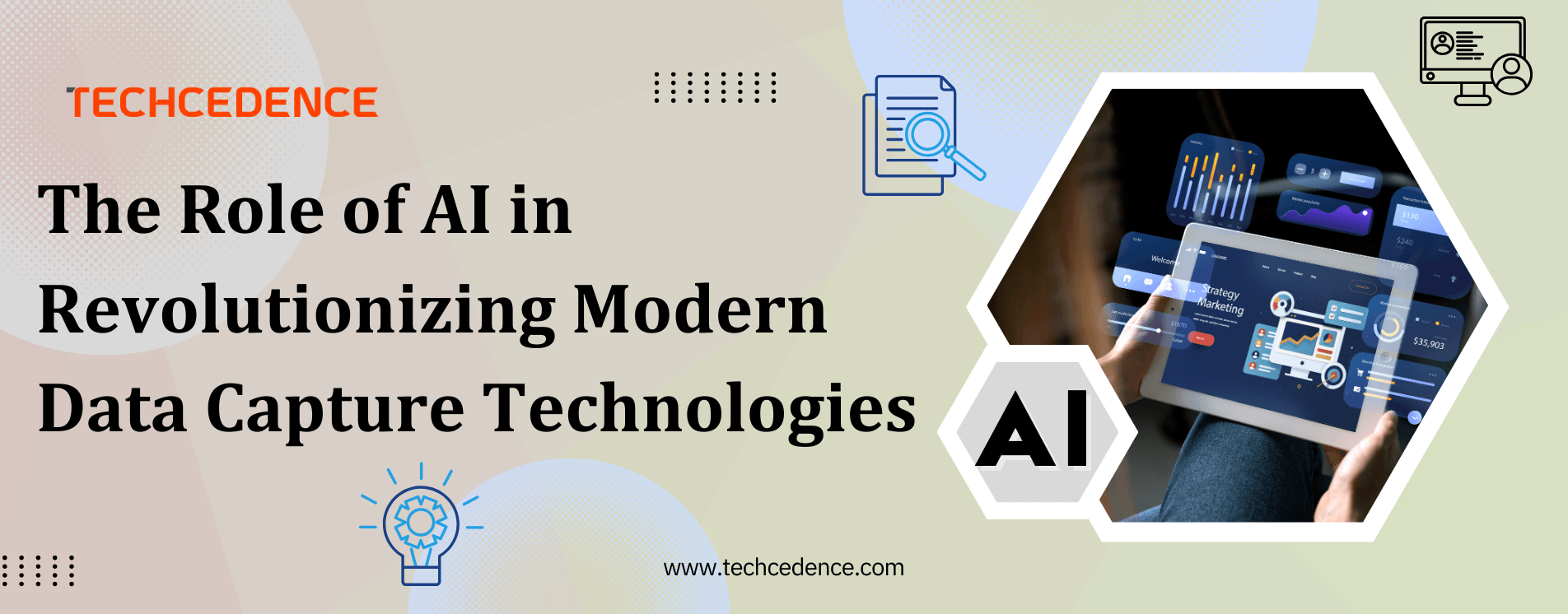
Categories : Uncategorized
Author : Date : Nov 21, 2024
Businesses are under constant pressure to make quick, informed decisions that can shape their success. The integration of Artificial Intelligence (AI) with smart data capture technologies is proving to be a game changer, enabling organizations to achieve real-time insights and data-driven decisions. This approach goes beyond the capabilities of traditional systems, allowing businesses to be more agile, efficient, and proactive in their operations.
Understanding Smart Data Capture in the Age of AI
Smart data capture involves utilizing cutting-edge technologies to autonomously gather, process, and evaluate data from a variety of origins. In the past, this typically relied on technologies like barcodes and RFID tags; however, as the demand for more profound insights increased, these techniques developed. Presently, smart data capture incorporates AI to make use of data gathered from different sources, including sensors, cameras, IoT devices, and even unstructured forms of data such as social media posts and customer feedback.
AI enhances this process by automating data analysis, recognizing patterns, and generating actionable insights. This means businesses can move beyond simple data collection to real-time interpretation, leading to smarter, faster decisions.
The Benefits of AI-Powered Smart Data Capture
1.Real-Time Data Processing
AI algorithms are capable of quickly processing vast amounts of data, which is essential for sectors such as healthcare, finance, and retail where timing is critical. For instance, in a retail setting, AI-driven systems can evaluate customer foot traffic information and modify staffing arrangements or promotional displays in real-time to maximize sales.
2.Enhanced Accuracy and Efficiency
By integrating AI, businesses can reduce manual errors and improve the accuracy of data collection. Unlike human data entry, which can be prone to mistakes, AI-powered systems ensure that data is captured and processed with high precision. This is especially beneficial in environments like supply chain management, where a single error can disrupt the entire logistics process.
3.Personalized Customer Experiences
AI’s ability to analyze customer behavior data allows companies to deliver personalized recommendations and tailored marketing. For instance, by analyzing past purchase behavior and browsing patterns, AI can suggest products that align with a customer’s interests, increasing the likelihood of a sale.
Real-World Applications of AI in Smart Data Capture
1. Healthcare:
AI-powered smart data capture technologies are revolutionizing patient care. For example, AI can evaluate information from wearable devices to track patient vital signs in real time, notifying healthcare professionals about potential problems before they get critical. Furthermore, AI can analyze data from medical images, like X-rays or MRIs, to detect irregularities that may go unnoticed by humans.
2. Manufacturing and Quality Control:
Vision systems driven by AI utilize cameras and machine learning techniques to evaluate products on assembly lines. This allows for the immediate identification and removal of defective goods, greatly minimizing waste and improving product quality. Additionally, AI can forecast potential equipment failures using sensor information, facilitating proactive maintenance and lessening downtime.
3. Retail and Customer Insights:
Retailers are progressively utilizing AI to gather and assess information from in-store cameras, point-of-sale systems, and customer interactions. By gaining insights into customer movement within the store, the products they show interest in, and their buying history, companies can enhance store designs, manage inventory, and refine marketing tactics. For instance, AI can deliver tailored offers to customers’ smartphones depending on their location in the store and their previous purchasing activities.
How AI and IoT Work Together for Smart Data Capture
The combination of AI and the Internet of Things (IoT) enables a seamless flow of data from various sources to drive actionable insights. IoT devices, such as smart sensors, collect vast amounts of real-time data. AI then processes this data to optimize operations, enhance customer experiences, and even predict future trends.
In smart city settings, AI-powered data capture systems monitor traffic patterns through IoT sensors to adjust traffic lights dynamically, reducing congestion. Similarly, in agriculture, IoT devices collect data on soil moisture and weather conditions, while AI analyzes this information to optimize irrigation and crop yield.
Overcoming Challenges in AI-Driven Smart Data Capture
1. Data Privacy and Security:
The enormous amount of data collected brings up issues related to privacy and security. Businesses need to adhere to regulations and establish strong encryption methods to safeguard sensitive data.
2.Data Quality and Bias:
AI systems depend on reliable data to operate successfully. Low-quality data can generate erroneous insights, and biased data can lead to unjust or inaccurate outcomes. Companies need to be proactive in cleansing and verifying their data.
3.Implementation Costs:
Integrating AI with existing systems can be costly, particularly for small and mid-sized businesses. However, cloud-based AI solutions and scalable platforms are making it easier for companies to adopt these technologies without significant upfront investments.
Future Trends in AI and Smart Data Capture
The future of data capture enhanced by AI looks bright, as new technologies are poised to take it to new heights:
These developments suggest a future where companies can make decisions that are not only quicker but also more informed and precise.
Conclusion
Integrating AI with smart data capture technologies is reshaping how organizations collect, analyze, and act on data. By embracing these innovations, companies can gain a competitive edge, streamline their operations, and offer personalized customer experiences. This integration does not only enhance operational efficiency but also empowers businesses to adapt dynamically to changing customer needs and market conditions, ensuring sustained growth and success.